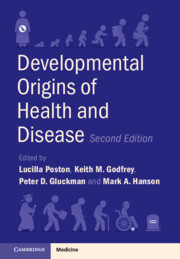Book contents
- Developmental Origins of Health and Disease
- Developmental Origins of Health and Disease
- Copyright page
- Contents
- Contributors
- Preface
- Section I Overview
- Section II Exposures Driving Long-Term DOHaD Effects
- Chapter 2 The Evolutionary Basis of DOHaD
- Chapter 3 Timing
- Chapter 4 Long-Term Effects of Food Insecurity and Undernutrition in Early Life
- Chapter 5 Short- and Long-Term Effects of Maternal Obesity and Dysglycaemia for Women and Their Children
- Chapter 6 Long-Term Effects of Prenatal Maternal Stress and Mental Health
- Chapter 7 Environmental Exposures in Early Life
- Chapter 8 Developmental Programming and the Microbiome
- Chapter 9 Exposures Driving Long-Term DOHaD Effects
- Section III Outcomes
- Section IV Mechanisms
- Section V Interventions
- Section VI Public Health and Policy Implications of Interventions
- Index
- References
Chapter 8 - Developmental Programming and the Microbiome
How the Maternal Environment and Early Life Shape the Infant Gut Microbiome Pathway(s) and Risk of Disease
from Section II - Exposures Driving Long-Term DOHaD Effects
Published online by Cambridge University Press: 01 December 2022
- Developmental Origins of Health and Disease
- Developmental Origins of Health and Disease
- Copyright page
- Contents
- Contributors
- Preface
- Section I Overview
- Section II Exposures Driving Long-Term DOHaD Effects
- Chapter 2 The Evolutionary Basis of DOHaD
- Chapter 3 Timing
- Chapter 4 Long-Term Effects of Food Insecurity and Undernutrition in Early Life
- Chapter 5 Short- and Long-Term Effects of Maternal Obesity and Dysglycaemia for Women and Their Children
- Chapter 6 Long-Term Effects of Prenatal Maternal Stress and Mental Health
- Chapter 7 Environmental Exposures in Early Life
- Chapter 8 Developmental Programming and the Microbiome
- Chapter 9 Exposures Driving Long-Term DOHaD Effects
- Section III Outcomes
- Section IV Mechanisms
- Section V Interventions
- Section VI Public Health and Policy Implications of Interventions
- Index
- References
Summary
Maternal and infant microbiota are an emerging target of investigation and have particular relevance to disease, ranging from obesity and diabetes to many immunological disorders. Infant gut microbiome colonization and growth are influenced by environmental stimuli such as mode of delivery, infant diet (breastmilk), antibiotic exposure and maternal characteristics including obesity, diet and gestational diabetes. Alterations to the normal bacterial colonization and maturation of the infant gut microbiota – notably short chain fatty acid producers in the phylum Firmicutes and lipopolysaccharide-producers of the family Gammaproteobacteria – can lead to substantial differences in host-microbe interactions and altered neonatal immune system memory/development. Remodelling these pathways during early life may hold promise for correcting developmental programming of both innate and adaptive immunity associated with insulin resistance, pre-diabetes, obesity, non-alcoholic fatty liver disease and diseases linked to dysregulated immunity in youth, including Type I diabetes, asthma and allergies.
- Type
- Chapter
- Information
- Developmental Origins of Health and Disease , pp. 66 - 74Publisher: Cambridge University PressPrint publication year: 2022

